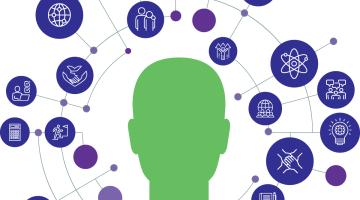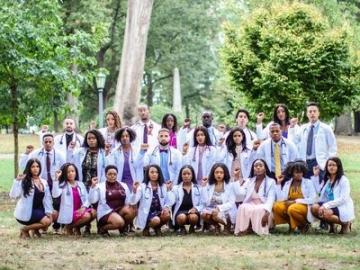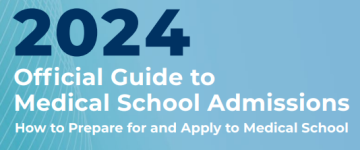New section
“Medical training, and medical practice, is extremely humbling. You might do everything right and still not get your desired outcome. Always remember the importance of preparation and perseverance. Preparation will get you ready for the challenges, perseverance will keep you going when preparation isn’t enough.”

Medical School: MD-PhD, University of Wisconsin Madison School of Medicine and Public Health, 2018
Undergrad: BA in biochemistry, Saint John’s University, 2010
Editor’s Note: The opinions expressed in this article are those of the author and do not necessarily reflect the opinions, positions, or the polices of the AAMC or its members.
New section
Background
- Hometown: New Hope, Minnesota.
- Worked as a firefighter and EMT in college and became the captain of his university's fire department.
- Dealt with medical emergencies that inspired him to go to medical school.
- Applied to medical school without the support of a prehealth advisor or mentor.
- Participated in research on molecular chemistry during undergrad and molecular neuroscience in medical school.
Academics
Daryl’s early college grades were not very competitive, but his MCAT® score was strong, and his overall academic performance reflected an upward trend. Admittedly, he lacked adequate study skills, and he found himself balancing non-academic responsibilities with his coursework. “The part of Daryl’s application that gave us pause was his GPA,” recalled Chelsea Hanewall, Co-Administrator, Medical Scientist Training Program, University of Wisconsin-Madison. “His science and overall GPA were both significantly lower than our average.” At the suggestion of a biochemistry professor, he identified his weaknesses and spent two summers repeating courses in order to demonstrate academic rigor. “Daryl definitely showed improvement,” Hanewall added. “We saw that his GPA was not necessarily reflective of his ability.” Daryl states, “Sometimes grades aren’t indicative of your knowledge base. Don’t be afraid to identify and correct your shortcomings.”
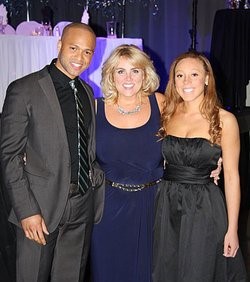
Retaking courses and committing himself to learning the material also made it easier for him to study for the MCAT exam. “The best preparation for the MCAT [exam] is to do well in your college courses. Retaking several courses and truly learning the material helped create a foundation that I was able to build off of during MCAT preparation. Don’t walk into the MCAT [exam] hoping that you’re going to have a moment of epiphany where all of the material suddenly makes sense. Learning through structured coursework throughout undergrad makes MCAT studying more a review rather than a first exposure.”
Experiences
Through his work as a firefighter and EMT, Daryl developed a commitment to quality patient care. “My path to medical school was unusual. I didn't know any doctors growing up. As a firefighter, I learned how important it is to stay calm and focused during stressful situations, a skill that is very important in medical training/practice. While I would not necessarily say my real world experiences put me at an advantage, I believe this experience was important in preparing me for the challenges of medicine.”
“My undergrad research experience spanned 2 years and focused on biochemistry and chemistry. Rather than hop around various topics, I focused on two projects to show my commitment to quality and completeness. My research experiences provided structure to my day and forced me to block out time for studying, which I believe helped me improve my academic performance during my junior and senior years.”
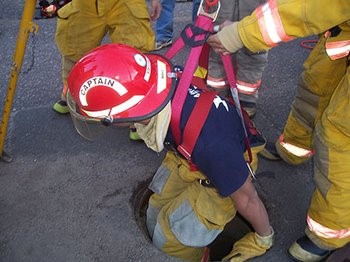
Personal Statement
When preparing to write his personal statement, Daryl drew upon the experiences that motivated him toward a career in medicine in the first place. Daryl used his statement to communicate his understanding of the medical profession and his desire to bring quality care to those in need. “I based my essay on my personal experience, specifically my minimal exposure to healthcare as a child, and my unique interactions with being a firefighter/EMT within a rural farming community. I discussed how both urban and rural communities are challenged with limited healthcare resources, thus quality (vs quantity) patient centered care plays an important role in ensuring better outcomes, regardless of where or what one practices.”
According to Ms. Hanewall, the information Daryl shared in his secondary essay helped provide context for his low undergraduate grade point average. “Daryl explained that during undergrad he had to rearrange his schedule in response to a family emergency. His grades were lower during that time, but this was clearly not a lack of effort, rather, a shift of priorities in his life.”
Letters of Evaluation
Daryl carefully selected three letter writers who could supplement the information found elsewhere in his application. “I asked my fire chief to write a letter because I knew that he could speak to my leadership skills and reliability, two important attributes that I wanted apparent within my application. I also asked a research mentor because I knew she could highlight my commitment and creativity. My last professor focused on my early struggles and later improvements in academic performance. This balance allowed me to supplement my application by bringing out my strong attributes while reinforcing my maturation throughout undergrad. “A transcript doesn’t always reflect what kind of student you are. If you struggle early on, it’s important to reinforce growth and maturation by correcting shortcomings and improving with time.”
Daryl’s letters of evaluation painted a picture of a focused, articulate, knowledgeable, and resilient candidate who was also a deep thinker, a leader, and comfortable with public speaking.
Interview
Daryl was nervous about the interview process. Without the benefit of an advisor, he was unsure of the types of questions he would be asked, and he lacked a general understanding of what medical schools were looking for. “I worried that I didn't know I wanted to be a doctor early enough since I was never declared a ‘premed’ student in undergrad. I had a lot of anxiety about not having that track record.” He prepared for the interview by researching common questions and decided to simply relax and be himself. “When I was there it was all about being human and being honest. I think that carries more weight than having the ‘right’ answer. You have to realize that you are interviewing the program at the same time they are interviewing you. You want a program that’s the right fit for you, both in terms of administrators and student body. Being honest with your fellow applicants and the current students during [the] second visit allows you to see how you will fit in.”
“It's one thing to write about your research experience,” Ms. Hanewall explained, “It's another thing to be able to have a conversation about it. We're looking to see how students can talk about their research and how they plan to integrate this into a career path.”
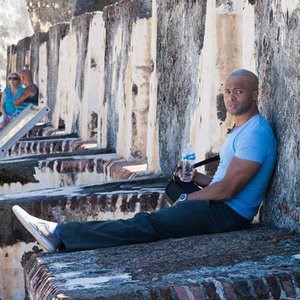
“The interview process at our school takes two days. On Friday, candidates meet with our director to learn about the curriculum structure. Then, they have a series of interviews with research faculty. Then we have some activities to let them get to know the community and city. Because Daryl applied as a transfer student, he had a slightly modified process where he interviewed with two directors, and we got feedback from the PI where he did his master's degree. Having information from his written application and director interview helped us. We would have really missed out had we decided not to interview or accept him.”
“In addition, Daryl expressed an interest in public health. For example, when he was a firefighter working with people without insurance and assuring them their care would be at no cost, [this was] an important factor for many patients who would have otherwise refused care. This really caught the committee's eye: he understood how public health impacted personal health. We're also looking for critical thinking and scientific inquiry, people who understand their research and understand what they are learning from these different steps. We're looking for good students that we would want to have as our own physicians.”
Why Daryl Chose UW
Being from the Midwest, he thought he was looking for something close to home. In hindsight, he notes that he picked Wisconsin not because of the proximity to Minnesota, but because it felt comfortable. “I felt a certain sense of comradery amongst the applicants, students, and even faculty. Being a part of a community was important to me, and it was evident that it was important to the University of Wisconsin as well. I’ve experienced a tremendous amount of support from the medical school administration, MD-PhD administrators, and the countless friends that I’ve made through my medical training. This is a program that is thoroughly invested in the personal success of each student.”
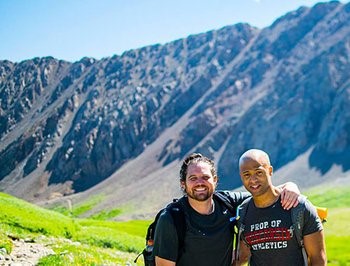
Exposure to the neurosciences, and some well-timed encouragement from former Dean of Students Patrick McBride during medical school, inspired him to pursue a research focus and transfer into the formal MD-PhD program. “While significant advances in acute care management have revolutionized our ability to prevent death from stroke or trauma, many patients still experience significant morbidity related to incurable neural deficits. My empathy for my patients and passion for improved patient outcomes pushed me to ask questions and pursue solutions related to neural rehabilitation and regenerative therapies. This eventually developed into a PhD and has guided my future career goals of practicing neurosurgery as a surgical scientist. Walking into medical school, I wasn’t aware that a combined career would be my eventual goal, but now that I am here, I know that this is where I belong”.
Why UW Chose Daryl
Ms. Hanewall identified several reasons why the admissions committee selected Daryl. “During his undergraduate career, he had a few semesters of undergrad research. This is not a requirement for the traditional MD program, but we are looking for this in our MD-PhD students. He probably wouldn't have been competitive right away, but because he took a leave of absence during medical school to pursue further research, it really showed us that he was committed, especially because he decided to take this leave of absence on his own. The research that he did after beginning medical school also demonstrated that he was passionate about becoming a physician scientist ... . I think the number one thing I admire about Daryl is his unfailing attitude. When he decides to pursue something, he goes for it 100%. For example, during his last year of grad school he began training to be a semi-professional body builder. No one was pressuring him to do this, but he wanted a challenge, and he did it. When he sees something he wants to do, he goes for it ... . He has become a superstar in our program. It shows in how he treats people and how he wants to spend his life. He has worked in free clinics — he really empathizes with the population and understands the causes of health disparities that aren’t readily addressed within the confines of the physician’s office.”
Ms. Hanewall noted that Daryl fulfilled many of the core competencies, but that “the two that stand out the most are service orientation and resilience and adaptability. Many people have jobs to support undergrad, and Daryl was a firefighter and EMT. He became the captain of his university's fire department while being a student and having other extracurricular obligations.” She also highlighted teamwork (his experience as a firefighter) and capacity for improvement, which he demonstrated through managing “shifting priorities, taking courses over again, and getting GPA back up to a higher level.” Additionally, she cited cultural competence, noting his “experience with the African American Male Forum which is a group of men who put on events for the community related to Black heritage” and that “He maintained a commitment to several organizations throughout undergrad. He wasn’t there for the résumé booster, [and] his passion and commitment were clearly evident. He’s a leader, competent in communicating and a strong mentor for diverse populations.”
New section
Highlighted Competencies
Note: This section helps to illustrate how multiple competencies can be demonstrated across many experiences, activities, and parts of your application.
Shows a commitment to something larger than oneself; demonstrates dedication to service and a commitment to making meaningful contributions that meet the needs of communities.
Worked as a firefighter and EMT in college, captain of university’s fire department.
Experience with the African American Male Forum.
Seeks out and engages diverse and divergent perspectives with a desire to understand and willingness to adjust one’s mindset; understands a situation or idea from alternative viewpoints; reflects on one’s values, beliefs, and identities and how they may affect others; reflects on and addresses bias in oneself and others; and fosters a supportive environment that values inclusivity.
Firefighter/EMT within a rural farming community, interested in communities with limited healthcare resources, African American history course, experience with the African American Male Forum
Effectively conveys information to others using spoken words and sentences; actively listens to understand the meaning and intent behind what others say; and recognizes potential communication barriers and adjusts approach or clarifies information as needed.
Captain of university’s fire department, letters of evaluation, interview.
Captain of university’s fire department; had to shift priorities during a family emergency, but was able to bounce back; spent two summers repeating courses in order to demonstrate academic rigor.
Practices continuous personal and professional growth for improvement, including setting and communicating goals for learning and development; reflects on successes, challenges, and mistakes; pursues opportunities to improve knowledge and understanding; and asks for and incorporates feedback to learn and grow.
Overall academic performance reflected an upward trend, spent two summers repeating courses in order to demonstrate academic rigor.
Uses logic and reasoning to identify the strengths and weaknesses of alternative solutions, conclusions, or approaches to problems.
Strong MCAT scores, research experience, understood connection between public and personal health.
